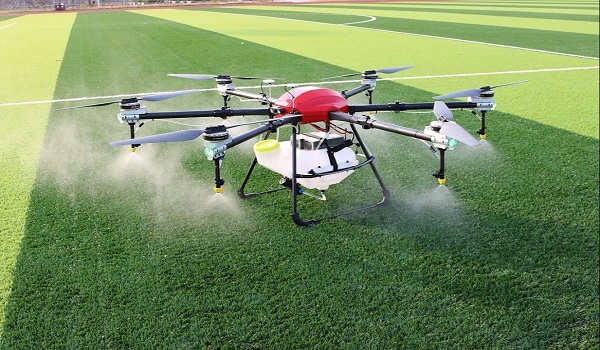Drones are increasingly becoming a vital tool in India’s agriculture sector, supported by the emergence of over 220 drone startups as of February 2022. While the adoption of drone technology in agriculture faces challenges such as high costs, regulatory hurdles, and a lack of technical expertise among farmers, supportive government policies and technological advancements are paving the way for a promising future in the agri-drone business.
India’s agricultural sector plays a crucial role in supporting the nation’s GDP, workforce, and food security, with many citizens relying on it as a primary source of income. The introduction of drones in agriculture holds significant potential to enhance productivity. Drones can spray an acre in just 5 to 7 minutes and cover up to 25 acres daily, compared to the 2 to 3 acres managed by traditional labour methods. This efficiency reduces reliance on labour and creates a safer working environment by eliminating the need for workers to be exposed to hazardous chemicals during spraying.
Agri-drones contribute to water conservation and optimize the use of pesticides and fertilizers by ensuring uniform distribution across fields through precise mission planning. Recognizing the potential of this technology, the Indian government has launched several initiatives under the “Drone Shakti” program, which includes crop assessment, digitization of land records, insecticide spraying, and nutrient delivery through Drone-As-A-Service (DAAS). Financial support, ranging from 40 to 100 percent, is available under the Sub-Mission on Agricultural Mechanisation (SMAM) for entities such as farmers, agricultural graduates, Farmer Producer Organisations (FPOs), Krishi Vigyan Kendras (KVKs), and State Agricultural Universities to purchase kisan drones and receive drone training.
Despite being the world’s leading agricultural producer, the integration of technology like drones in Indian farming was not widely anticipated just a few years ago. Today, over 2,800 entrepreneurs are driving the agritech revolution, aiming to position India as a global leader in precision farming.
The future of agri-drones in India looks promising, with market research suggesting a growth rate of 31.5 to 38.5 percent. In the coming years, agri-drones are expected to become a common tool among farmers across the country. The increasing demand for precision farming, advancements in drone technology, and robust government support are key factors driving this trend.
Chirag Sharma, CEO of Drone Destination, cited the government’s recent approval of the Central Sector Scheme, which provides Rs. 1261 crore for the procurement of drones by women’s self-help groups (SHGs). The objective is to equip 15,000 selected SHGs with drones so that they may rent the technology to farmers for agricultural uses like fertiliser and pesticide application. Major fertiliser firms such as IFFCO and Coromandel have already placed large contracts for drone spraying services, totalling more than two crore acres. The cost of drone services ranges between Rs. 400 and Rs. 700 per acre, depending on the size of the area and the type of crop.


